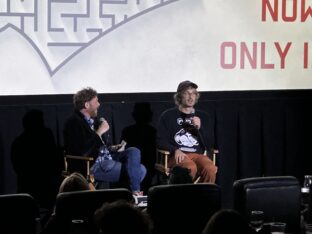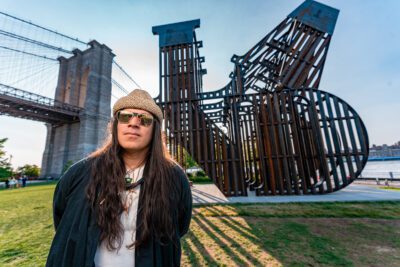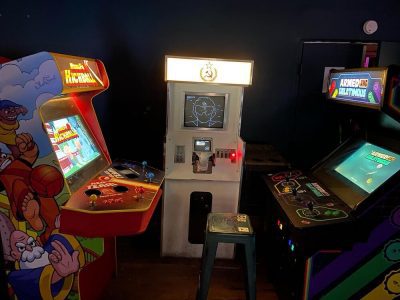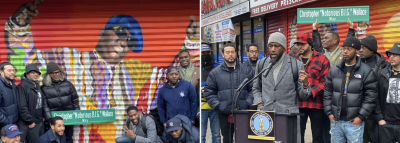David Farrier (photo illustration by Johansen Peralta)
The unbearable creepiness of ‘Mister Organ’
In a quirky new documentary, journalist David Farrier is pulled into the sinister web of a tedious narcissist conman
Like what you’re hearing? Subscribe to us at iTunes, check us out on Spotify and hear us on Google, Amazon, Stitcher and TuneIn. This is our RSS feed. Tell a friend!
David Farrier is a New Zealand journalist who has a knack for finding stories in the nooks of culture, bizarre phenomena often hidden in plain sight. His first feature-length documentary, 2014’s “Tickled,” started as a light and quirky exploration of the world of competitive endurance tickling, which is exactly what it sounds like. But as he peeled back the layers of what seemed like a silly subculture, he ran up against the shadowy and quite sinister forces behind it.
His new movie, “Mister Organ,” is currently in select theaters across North America and will be available on demand November 21. Like “Tickled,” “Mister Organ” began as a bizarre slice-of-life feature that would gradually become an all-consuming nightmare for the filmmaker. The titular Mr. Organ is Michael Organ, a conman and bully, a sociopathic narcissist who landed on Farrier’s radar for an extortion racket that involved putting boots on parked cars at a private antiques business.
It isn’t long before Farrier recognizes Organ as a self-proclaimed royal, a phony lawyer who years ago made headlines for a yacht stealing scheme that landed him in jail. It isn’t long after that that Farrier is pulled into Organ’s creepy web of lies and charm, threats and manipulation — and boredom. At one point, Organ reveals that “someone” has given him the key to Farrier’s home. It only gets weirder from there.
I had the pleasure of interviewing Farrier after a recent screening of “Mister Organ” at Alamo Drafthouse in Downtown Brooklyn. This week’s episode of “Brooklyn Magazine: The Podcast” is a recording of that conversation. Heads up: There are some minor spoilers for folks who haven’t seen the film yet and would like to avoid them.
The following is a transcript of our conversation, which airs as an episode of “Brooklyn Magazine: The Podcast,” edited for clarity. Listen in the player above or wherever you get your podcasts.
Before we get started, I want to ask, is Michael in the audience? Is he here anywhere? I was keeping an eye out for him. Has he shown up at any place?
No, not in America. We showed this in New Zealand a little while ago now, and in the bank building where the last three quarters of the film takes place, the cinema in that town, in Whanganui, is opposite, and they played “Mister Organ.” And he went along to every screening.
Every screening?
Yeah. He sat in the back row, and surprise, surprise, he just talked through the whole thing.
Were you at these?
I didn’t go. We rolled it across New Zealand, and there was a question about whether I would go along. But at that point — and I’m still at that point — I don’t want to see them again. There would’ve been stuff that happened, I suppose, and it would’ve been good publicity or something, but yeah, absolutely not.
I’m sorry, what was your new address again?
[Laughs.] America.
So, you haven’t been in touch with him at all since this completed?
No, I haven’t been in touch with him. He did fabricate some legal cases in New Zealand, and sort of drew me into them. So, occasionally I have to sit for a day in my apartment and Zoom into court in New Zealand. And he eyeballs me when he walks in front of the camera in the court, which is better than being with him. I haven’t been in any in-depth conversations with him, but via the courts, he’s been in touch.
Have you heard from his other victims — I don’t even know if victim is the right word — since this came out? People who are not in this film but materialized? Have you heard from Jillian at all? What do we know?
No. I mean, Jillian is still… She’s in a pretty bad situation. I mean, she’s not going to get out of that. That’s her. Heard from lots of other people. That’s the thing. It happened with “Tickled” as well. You finish making the film, and then it goes out, and about three months after that, you start hearing from all these people. And in the back of your mind, you sort of think, “Where the fuck were you a year ago? Where the fuck were you?” But yeah, no, Michael has many different victims that I didn’t encounter while making the film. I mean, very early on, when he was living out at the psychiatric hospital, because I was essentially lazy, I hired a private investigator just to follow him for a few days. And he spent a lot of his time just driving in his van to the local supermarket, or what do you call it here?
Supermarket works.
Grocery store. OK, cool. He’d just go there and sit in the van, and just watch people coming in, going for about five hours. And that’s just him waiting for his next mark. He’s just always looking for someone else. And so, I’ve heard from lots of people. He’s got a lot of things going on simultaneously, and I’ve heard from a lot of those people. And it’s the kind of stuff you’d expect. It’s more of the same.
It doesn’t sound like it, but you mentioned during the film that spending time with him was a tax on your soul, a soul tax. Do you miss him at all? Do you have PTSD?
We use a lot of dark humor in our little team. On the road, it was me and Dom Fryer. He shot “Tickled,” he shot “Dark Tourist,” he shot this. And then [Danny] Watts on sound. It was the three of us around. And there was an ongoing joke that we’re going to fall in love and end up marrying each other. And yeah, I could think of nothing worse.
You guys are the same age! He looks 20 years older than you.
No, I never want to see him again. It’s good to laugh about it now. I’ve got some distance from it now. But at the time, it was horrible, and I didn’t enjoy it, and it’s not a fun time.
It’s interesting that you say that, because there was a moment in the film where you actually say the words, “I have to make this film.” What did you mean by that? Were you financially obligated? Contractually?
I wonder if I should have been more specific about that. Because in hindsight, that is the question that comes up continuously of like, why did I keep doing it? And I don’t know, maybe it was good to keep it vague. But there were three reasons, practical reasons. One, it was like an ego thing. I started, I wanted to finish it. You invest three years. If you bail after three years, that just felt awful.
In for a penny.
Yeah, all that. So, there was that. But then there was also, I had investors in the film, and I wanted to deliver something in a very practical sense. But then also, the other thing was by that point I’d spoken to so many people who had trusted me with these stories. And for them, they’d met Michael and just been fucked. They’d had this horrible thing happen. Nothing good came out of it. In their mind, in being in this, at least their experience had some value, in that they could tell a story as a very practical warning to people in New Zealand. But also as a bigger idea of, this is a kind of person that exists in the world. We hear a lot on Netflix about serial killers and all these very dramatic over-the-top sort of murderers, but Organs are everywhere. Some of you will know traits of that. Parents, or your boyfriends. Not girlfriends. Often just boyfriends. And so, they had these stories that entrusted me with them. And for me to bail, it would be leaving them again just left, and I didn’t want to do that. So, all those things compounded into that feeling. There were a lot of moments where I was bubbling away to myself. That was just a moment where there was a camera around.
So, you said three years. Is that how long this took? Did Covid get in the way?
Yeah, Covid got in the way.
What was the timeline here?
I mean I first heard about Michael in 2013 from a colleague of mine in the newsroom who’d been clamped by him. She originally started the film. She came into the newsroom and she was just in tears. She was distraught, and she told me that she’d been clamped by this guy. And I remember thinking in 2013, “Why are you so upset? You got clamped. It’s annoying. You pay some money, and you move on.” And I remember that very clearly. Three years later, his clamping had got to a point where it was all over the New Zealand media. Then I became interested again, and then I started shooting with him in 2016 as “Tickled” came out. And then later that year, I’d started to interact with him.
Do you know if he’d seen “Tickled?” He must have.
Very early on, I walked into his antique store, just to kind of see what that store was like. And he rushed to his computer, and it was obvious that he’d seen me but didn’t quite know. And I just saw he’d Googled, and “Tickled” posters were coming up. So, he was obviously seeing if it was me that had walked in. And I just walked straight out. At that point, I didn’t want to be trespassing, because I knew I wanted to do more. But I don’t know if he’s seen it or not.
I think he’d like it.
Might find a friend.
When did you come to this conclusion which you reached at the end of the movie — six years is a long time — that he’d been talking about himself all along?
That’s the other annoying thing, because I feel like … I don’t know, you watching it, you probably clocked it.
When he said the words, “sheep in wolf’s clothing,” I’m like, “Well, yeah, you’re talking about yourself.”
Well, yeah. OK. So, that was very obvious. And I don’t know, if I had my life again, maybe I wouldn’t make it such a … “Wow, this is what happened.” But that was what it was like for me. And I think I’ve been so dulled down by spending time with him. He did scramble the way I thought about things.
And none of our team, our editor, Dan Kircher, we caught that super late. Because he was doing it constantly. He was always just talking about other people. But when we zero down to the specifics, to the point when he is talking about Brent, that this is the shammy sort of guy that pretends to be a lawyer, he gets so specific. And so, to answer your question, I figured that out super late. That was my reality. Maybe I’m a fucking idiot. I feel like an idiot when I’m watching it, because I feel like an audience watching is ahead of that way more than I am.
Well, that’s because of your expert editing.
But yeah, it was super late in the game that we figured that out.
Did you ever come to a conclusion of what his deal is, what his neurosis or pathology is? The press material for this calls him a “nightmare narcissist.” He’s more of a sociopath. I’m a journalist. I’m not a psychiatrist, but what do you—
The tricky thing is, if I talk about it, and then it gets in print, and then Michael reads it, then he goes and makes a new lawsuit in New Zealand. If you want my extended thoughts, see me afterwards when we’re not recording. I think he’s got a lot of things going on. There was a version of the film, same with “Tickled,” where we were debating whether to talk to an expert about him. And you can’t get any kind of analysis of someone if he doesn’t want that. No psychiatrist will do that on camera. You can’t just get a psychiatrist to say what someone has if that person isn’t part of that process. So, that just was never going to happen.
Because that was the one knock in the New York Times review.
I kind of like the way the Times framed it, because it’s the way I saw it. To try and analyze it takes away from what the experience of it is. The second you have an expert talking head talking about this thing, I think it completely lifts you out of whatever mentality you’re in when you’re watching it. And just, I think it would derail the entire doc, having an expert pop up and be like, “OK, so, this is what’s happening.” It’s not the “Big Fucking Short.” It’s not that, and it was never going to be that, and I just have no desire to make that kind of documentary. It was the same in “Tickled.” I was never going to have an expert come up and talk about what was going on in David D’Amato’s head. I just want you to experience what I experienced, and just walk away with that. Because I also don’t give a fuck about why he was like he was. I’m not interested in that. The entire point is that there are people like him walking around in the world, who are completely able to do that, and function very well, and that’s what we have to deal with.
How calculated do you think it is? Or do you think that’s just how he’s wired?
It’s a bit of both.
Watching it, you feel like you’re drowning [when you talk to him].
Yeah, completely. I think he’s wired in a certain way, but I think he knows exactly what he’s doing. He’s always a step ahead the entire time, yet incredibly calculated.
You say at one point in the movie that he has more money than you. How much money do you have?
So much.
Where does his money come from?
What I was talking about at that current point in the film was, Jillian has a lot of money. When they sold that antique store, I think the value of that was about a $3 million or something. And 3 million, in today’s world, I guess that’s not—
I’d take it.
It is a lot. I’d take it also. For him, that’s everything he needs to function for the rest of his life. So, he’s doing really well with Jillian currently.
Is anyone going to rescue her?
People have tried. Yeah. No, she’s alone in this.
Is it patronizing to say she needs rescuing? Is she happy?
Yeah, no, she’s not happy. So, no one can do anything. I mean, when I started this back in 2016, I imagined people coming in having some sort of an extraction or an intervention. That was always going to be part of it. But what I figured out as we shot is that was never going to happen. Michael has got her so isolated. And there was a whole other path of this film where I sort of explained how he isolates people. Because that’s a whole other thing. But like everything in Michael’s world, it was too complicated to tell in a film. But he essentially set up every one of Jillian’s friends in a way that Jillian would view them as being no longer a friend. All these elaborate stories. And so, eventually, she’s got no one.
It’s like the classic cult leader personality type, almost.
It’s pretty culty.
Over time, were there techniques that you developed to talk to him, or to handle talking to him?
No, I never did. And again, it’s hard for me to watch the doc. Because my technique from the beginning was just to be not too combative and just sort of nod along to whatever he said.
And he’ll keep going.
Yeah. And maybe eventually he’ll slip or say something. That was my technique, sort of was to be more confrontational toward the end. But no, any plan I came up with to try and get a specific bit of information out of him always fell flat. All of it.
Was there anything from filming “Tickled”? Because as you noted, there’s a lot of similarities. Is there anything you learned from that experience that you applied here? Any mistakes you made?
Tried. I tried. Everything I learned in “Tickled,” I applied to this, and none of it worked. “Tickled” was a walk in the park. That was so easy. David D’Amato worked with a sense of predictability and logic, and Michael was none of those things.
He’s like a whirlwind.
Yeah. And so, I went in with a map of how I wanted this to go, as I’d done with “Tickled,” and none of it worked. Which is why it just ended up in this process of just being so lost in it. Until I met Peter in the psychiatric hospital at the end. That’s when it kind of came together.
Right. Talk about the type of stories as a journalist aside from this that you choose to do. Because these two — “Tickled” and “Mister Organ” — just happen to be very similar, but these are sort of the nooks and cracks of people hidden among us in the crevices of humanity. How do you find them? Are there projects like this that you’ve started that you did bail on?
I like mysteries. I like a good mystery. I have this annoying, pretentious sense of justice. I feel like bad people shouldn’t be doing bad things. And I see it, and I’m like, “Why are you doing that?” And I want to understand what’s going on.
Do you think of yourself as brave? Because in both of these movies, there are moments where I’m like, “What’s the risk reward analysis?”
Yeah, I’ve been lucky so far. I don’t think I’m brave, because I’m always with other people. I’m not there on my own. I’ve always got Dom. My DP is always there. There’s a moment that was not in the film where he took me into a safe in the bank vault, and I was alone with him in there, and that felt bad. But I was in the corner, and he was by the big safe door, and I just imagined him just shutting us in, and it was horrific. I don’t think I’m brave, I just think I’m curious, and I’m fascinated by people that are living life in a different way to the way I live it. I write a newsletter, and I spent a year writing about a megachurch in New Zealand that was also incredibly messed up. It was the same drive to write about that church for a year, as that was the same sort of crazy manipulation happening in plain sight. I like things that are happening in front of us that everyone sort walks past, but I want to go, “Hey, what is actually going on here, and can I figure out what is happening?”
And there’s a difference though, between that kind of journalism where you’re shining a spotlight on something, and what you’ve done, at least with these two movies: the spotlight is also on you. You become part of the story. I don’t know if there’s a tension there. If you’re observing a thing, it’s Heisenberg’s principle: You’re observing a thing, and then once you insert yourself into it, does it change the phenomenon? Or is it a good way of illustrating what the phenomenon is?
I never intend to be in things as much as I am. I am in them a lot, but I’m very self-conscious, and I don’t like being in things. “Tickled,” I didn’t mean to be in it. I knew there was a story about this crazy shit that was happening. But then when they sent lawyers to New Zealand, I couldn’t help but document that stuff.
Become part of this story.
And with this, my intent was to not be on camera, and to document this man, and the people he had affected. But then it was exactly the same. So, maybe I’m very naive in thinking how much I’ll get sucked into things. The bonus is, it’s like a really good storytelling technique because it gives you license to insert your own thoughts, and it’s just a much easier way to weave together what’s going on if your voice is in it. I don’t want to be in them, but I’m in them, and this is the worst answer I’ve ever given.
All right. So, that took six years. I don’t know how long “Tickled” took—
Three.
Three. Right. Are you being sucked into something right now that we should be worried about?
I’m actively avoiding it. Yeah, no, actively avoiding it. I write my newsletter Webworm, I do my podcast, which are fun things. At some point, I want to do the third film in a series of bad men.
I think we have time to open it up. I’m sure people have questions. [Question from the audience: When does a weird anomaly become movie-worthy?]
I think it’s when a few things combine. It’s when things are still unfolding. And that’s why I feel proud of “Tickled” and this. So many stories that are in a true crime, I don’t know, like a genre, the central person is in prison or they’re dead. And it’s really hard to make a film about someone who’s still active, because they can constantly sue you. And so, it’s really stressful, and I feel really happy. I feel proud of that element of it. I find a story interesting when it’s still ongoing and when the characters sing on camera. There’s a point when you’re writing about it where you’re just missing so much and you’re just like, “If these people were on film, then it would just lift and elevate everything so much.” And that’s what I felt with “Tickled,” and that’s what I felt with this. For instance, the megachurch stuff, I’ve been writing about that for a year, but I don’t think that’s a documentary. I think it doesn’t have whatever the thing is that makes me excited. So, I’ll just wait for whatever that thing is.
How many times have you been sued now?
Cease and desists are like a dime a dozen. But sued, only twice. David D’Amato has sued me twice in America, which was horrific. Then he had a heart attack.
Cease and desists are scary.
Cease and desists suck, but being sued sucks so much more. Because then you’ve got to come up with a defense and hire lawyers and stuff. It’s horrible.
[Audience question: When you don’t know what the ending’s going to be, is it frustrating?]
I think we’ve all been a bit fucked in the head with storytelling, and I think “The Jinx” has ruined all of us. Because when you’ve got a guy that goes into the bathroom, and they’re still recording the mic, and he’s like, “Oh my God, I killed them all,” you have a world that wants that. Real life isn’t neat and tidy. There’s never an ending. Bad stuff keeps happening. It’s never resolved. And I think we’re all used to watching a film that we want like a neat ending. And when you don’t get any ending, you feel frustrated. But that’s why life is frustrating, because there’s never any real closure. Closure never exists. People think it does. It never does. You have to tie it up in some way, and what’s the ending for this? Him in prison or dead or something like that. That might happen at some point.
For me, I felt really satisfied when I walked into this wondering why this antique store owner in New Zealand had suddenly hired this bonkers man to extort people for money. And I ended up knowing a lot more about this man, and that she wasn’t the one that was in control, but he was. And I think Peter, who was the most broken person in the entire film living out at Kingseat [Hospital], he had a lot of issues, but he was the most clear spoken. He summed up the themes of the film, he summed up plot points. It was all just there. And that for me was all I needed to know. And yeah, it’s not neat and tidy, but that’s real life. And I think everyone, including myself, has been fucked by “The Jinx,” by wanting a perfect ending that shouldn’t happen.
Well, I mean, and they were fucked by it, too, right? Because they were sitting on evidence for months.
Well, there was manipulative editing, and the way that conversation played out was a little bit different in reality to what was portrayed.
[Audience question: Did he have a crush on you?] He did get flirty at times.
Yeah. There were a few people that thought I did slap him on the ass, which annoys me. Just for the record. No. In the moment, I genuinely didn’t think that. But in hindsight, I think he was absolutely flirting, and there was this weird element to it, and I think that was a bit of the push and pull of hanging out together. So, yes. Horrible question.
He does seem to get off on it, and his name, Organ, is kind of perfect, right? It’s gross, squiggly, and squishy.
Yeah. Awful.
[Audience question: How’d he get the key?]
Working theory to the key, I don’t know. I think probably he was watching the house. I lived with three people, three housemates. He was watching the house, we’d all left. He was alone with the door knob. He either got a locksmith and talked them into, it was his house, and they needed a key for the house, and you can get a key. That’s the most obvious thing I can think of. Again, there were four of us in the house. He followed us, swiped a key at some point. Got it cut. The main thing I find annoying about the key situation is that so many people we talked to openly spoke about him just being in there, waking up, and him being in the room. The sneaky creepy thing was mentioned a lot.
Did you change your lock? Because you didn’t in the film.
Oh, immediately. Oh yeah, day of. It was an awkward conversation with my housemates, trying to explain what was going on. You can absolutely prove none of it, but my feeling is that he would’ve absolutely been in the house at night.
[Audience question: Is Michael Organ a metaphor for Donald Trump?]
It didn’t really inform the film. It was something that myself and Dan Kircher, who cut the film, talked about a lot. I think we both just observed that we’re living in a time where truth isn’t particularly important, and it’s almost an advantage if you just kind of create your own version of your reality, and the reality of the whole ecosystem that you operate in, and just run with. It works. It’s a really good technique. Works for Michael, works for Trump. A-plus. Not for me, but it’s a time to do it. Michael would potentially function very well in America. At the same time, I think in a way he functions perfectly in New Zealand, because I think if he was pulling some of the shit he does in New Zealand here, I think he would get a crowbar to the face or someone would shoot him. And we don’t have guns really in New Zealand, and so, that’s not an option. We’re very passive hobbity people. So, I think New Zealand’s the perfect place for him.
Maybe we should send Trump there. He might do well for himself.
No, absolutely not.
[Audience question: How did you get so much on camera?]
[I’m] thinking of answering this in the context of Michael listening back to this recording, and what he would think. If he said “Off,” we would be still recording, but then in the edit it would inform what we could use. And so, I would always try and roll in as much as I possibly could. Because in New Zealand, the law is slightly different to … I don’t know what it is in New York. I had to study all this for “Tickled.” It’s like a one party system in New Zealand, so as long as one person knows things are being recorded, you’re fine. So, I recorded everything, and then I figured out later what we could use and what we could do. The whole thing was just this manipulative game. He would just do that because he wanted to annoy me, more than not wanting to be recorded. It was all just like a big power play. He loved cameras being on him so much. But just occasionally I think if he just wanted to fuck with me. He’d just be like, “No,” and just go through that whole rigmarole. And that would just happen continuously. He served me with legal documents, and then I said, “Would you like a coffee?” And he’s just like, “All right.”
That was amazing. That was amazing.
That was the entire film, was that.
[Audience question: What was the effect on the crew that Michael had?]
I think Dom has been traumatized, my DP, by everything that we’ve done so far. He’s a pretty paranoid person. Dom got worried about things a lot, and we all did at certain point. And I think at a certain point, we clocked that we probably needed to put a bit more care in place for all of us, about two years in, and start sort of figuring that stuff out. Danny Watts, our sound guy, just sort of found the whole thing sort of weirdly amusing, I think, and was just kind of curious about it all. Once we started being aware of how closely he would physically want to follow people, and sort of be aware of their lives, that’s when we all got quite paranoid for a time. But then we all just started taking basic safety precautions, and just being super aware of things. Dom was on a lot of [the TV series] “Dark Tourist,” where we were shooting with Pablo Escobar’s hitman who’d killed 300 people. And so, we were aware of how to deal with certain things. I guess what I’m saying is when we went into it we’re like, “Michael’s not that dangerous.” But as it went on and he became more dangerous and more manipulative, we started to just check in with each other a lot more. And that got us to where we could complete the film.
I think that’s all we have time for, unfortunately. But thank you everybody. Thank you, David. It was a great film.
Just spread the word. That’d be cool. It’s such a niche, weird little doc. It’s all word of mouth. And Taylor Swift releases her thing on the 13th, which is just going to crush everyone.
Check out this episode of “Brooklyn Magazine: The Podcast” for more. Subscribe and listen wherever you get your podcasts.
You might also like 



























